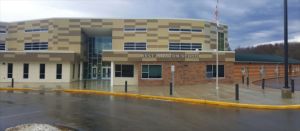If you heard research that shows $60 worth of books can make the difference between whether students lose reading skill over the summer, or whether they maintain it, would that motivate you to put books in children’s hands?
That’s what happened to Read Aloud Executive Director Mary Kay Bond.
With help from the Mary B. Nickell Foundation, the Carter Family Foundation and Brookfield Renewable, Read Aloud’s Summer Book Binge is now in its fourth year.
The number of schools involved has grown from one to four. Crichton Elementary in Greenbrier County, now funded by the Mary B. Nickell Foundation, was the site of the first summer book distribution four years ago with a grant from the Hollowell Foundation.
Last summer, Clear Fork Elementary in Raleigh and Gauley Bridge Elementary in Fayette followed. A fourth school, George C. Weimer Elementary in Kanawha, will participate this year thanks to the award from The UPS Store Inc.
Summer learning loss is a big problem. Children who do not have stimulating summer activities, such as parents or grandparents who read to them, can lose months of progress over the summer. Over the years, the loss is cumulative, so by graduation, students can be a year or more behind their peers.
Reading, just for fun, is a reliable antidote. Students who read for pleasure over the summer maintain or even gain skills.
Book choice and ownership are motivating, so Read Aloud works with those schools to let children see, hold and preview books in advance. Teachers talk about the books, offering their own experience and recommendations. Then each child in the school “orders” books, including a couple alternates in case their favorites run out.
On distribution day, each child gets a tote bag of his or her chosen books. Each book has a book plate printed with the child’s name.
Since the first summer book distribution in 2016, results have been promising.
On the 2014-15 statewide annual assessment, 30 percent of Crichton students scored proficient in reading, while the overall state score was 46.36 percent of students. While the state score has dropped slightly since then. Crichton’s is trending upward, standing at 57.58 percent of students scoring proficient as of the 2017-18 school year.
Crichton Principal Donna Nickell credits three things:
- Curriculum called Read Well where teachers work with whole classes, small groups and individuals to tailor instruction to students’ needs.
- Extra time and attention for children who need it.
- And Read Aloud West Virginia’s summer book distribution.
“I do attribute it to the books they’re getting, to Read Aloud, and to the Read Well program,” Nickell said. “I know the kids love the books over the summer,” she recalled at the start of the school year. “They were so excited. I’ve heard girls talking about books they got.”
At Clear Fork Elementary School, first grade teacher Lisa Cabell, said in her classroom, she can tell the difference between children who read or who have been read to at home and those who are not readers.
Even before the school’s computer assessment tool was functional this school year, Ms. Cabell said, she perceived improvement in some children’s reading skills at the start of the school year. She believes the summer books and the enthusiasm generated around giving children books at the end of the last school year contributed to the improvement she saw.
“I would like to see it again. I think it would be very helpful,” she said. “Our area is a very rural area. A lot of kids are not able to go the library, and they may not be able to afford their own books,” Cabell said. “We have the Bookmobile that comes to school and gives them a chance to get a book, but it’s great to have a book that you don’t have to give back.”





